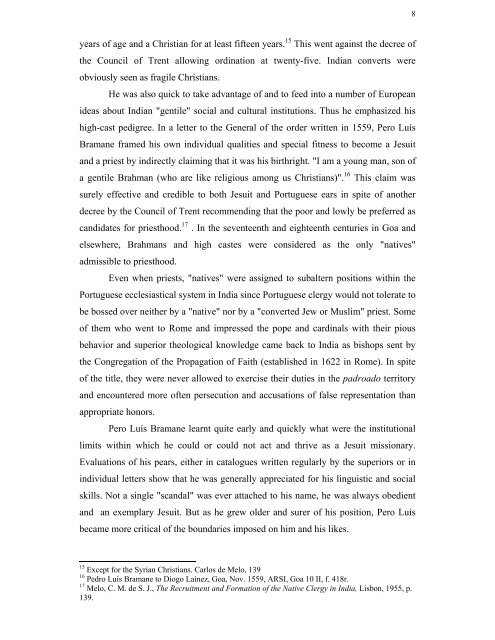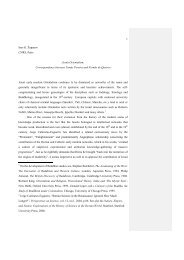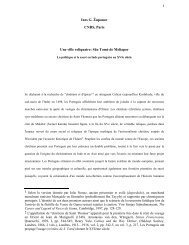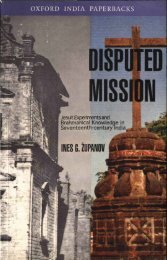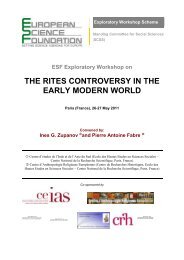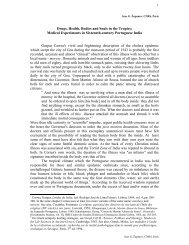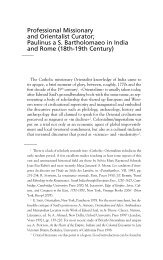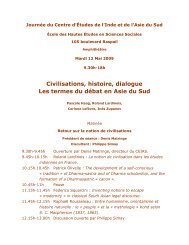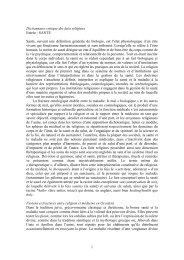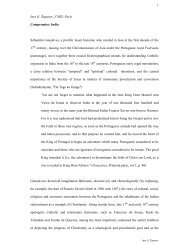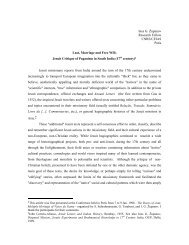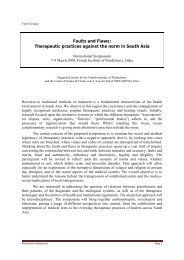Ines G. Županov, CNRS, Paris Portugal Índico Brown University ...
Ines G. Županov, CNRS, Paris Portugal Índico Brown University ...
Ines G. Županov, CNRS, Paris Portugal Índico Brown University ...
Create successful ePaper yourself
Turn your PDF publications into a flip-book with our unique Google optimized e-Paper software.
8<br />
years of age and a Christian for at least fifteen years. 15 This went against the decree of<br />
the Council of Trent allowing ordination at twenty-five. Indian converts were<br />
obviously seen as fragile Christians.<br />
He was also quick to take advantage of and to feed into a number of European<br />
ideas about Indian "gentile" social and cultural institutions. Thus he emphasized his<br />
high-cast pedigree. In a letter to the General of the order written in 1559, Pero Luís<br />
Bramane framed his own individual qualities and special fitness to become a Jesuit<br />
and a priest by indirectly claiming that it was his birthright. "I am a young man, son of<br />
a gentile Brahman (who are like religious among us Christians)". 16 This claim was<br />
surely effective and credible to both Jesuit and Portuguese ears in spite of another<br />
decree by the Council of Trent recommending that the poor and lowly be preferred as<br />
candidates for priesthood. 17 . In the seventeenth and eighteenth centuries in Goa and<br />
elsewhere, Brahmans and high castes were considered as the only "natives"<br />
admissible to priesthood.<br />
Even when priests, "natives" were assigned to subaltern positions within the<br />
Portuguese ecclesiastical system in India since Portuguese clergy would not tolerate to<br />
be bossed over neither by a "native" nor by a "converted Jew or Muslim" priest. Some<br />
of them who went to Rome and impressed the pope and cardinals with their pious<br />
behavior and superior theological knowledge came back to India as bishops sent by<br />
the Congregation of the Propagation of Faith (established in 1622 in Rome). In spite<br />
of the title, they were never allowed to exercise their duties in the padroado territory<br />
and encountered more often persecution and accusations of false representation than<br />
appropriate honors.<br />
Pero Luís Bramane learnt quite early and quickly what were the institutional<br />
limits within which he could or could not act and thrive as a Jesuit missionary.<br />
Evaluations of his pears, either in catalogues written regularly by the superiors or in<br />
individual letters show that he was generally appreciated for his linguistic and social<br />
skills. Not a single "scandal" was ever attached to his name, he was always obedient<br />
and an exemplary Jesuit. But as he grew older and surer of his position, Pero Luís<br />
became more critical of the boundaries imposed on him and his likes.<br />
15 Except for the Syrian Christians. Carlos de Melo, 139<br />
16 Pedro Luís Bramane to Diogo Laínez, Goa, Nov. 1559, ARSI, Goa 10 II, f. 418r.<br />
17 Melo, C. M. de S. J., The Recruitment and Formation of the Native Clergy in India, Lisbon, 1955, p.<br />
139.


